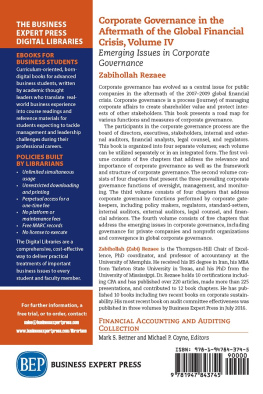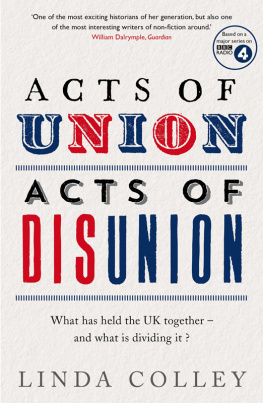John Colley - What Is Corporate Governance?
Here you can read online John Colley - What Is Corporate Governance? full text of the book (entire story) in english for free. Download pdf and epub, get meaning, cover and reviews about this ebook. year: 2004, publisher: McGraw-Hill Companies, The, genre: Home and family. Description of the work, (preface) as well as reviews are available. Best literature library LitArk.com created for fans of good reading and offers a wide selection of genres:
Romance novel
Science fiction
Adventure
Detective
Science
History
Home and family
Prose
Art
Politics
Computer
Non-fiction
Religion
Business
Children
Humor
Choose a favorite category and find really read worthwhile books. Enjoy immersion in the world of imagination, feel the emotions of the characters or learn something new for yourself, make an fascinating discovery.

- Book:What Is Corporate Governance?
- Author:
- Publisher:McGraw-Hill Companies, The
- Genre:
- Year:2004
- Rating:5 / 5
- Favourites:Add to favourites
- Your mark:
- 100
- 1
- 2
- 3
- 4
- 5
What Is Corporate Governance? : summary, description and annotation
We offer to read an annotation, description, summary or preface (depends on what the author of the book "What Is Corporate Governance? " wrote himself). If you haven't found the necessary information about the book — write in the comments, we will try to find it.
What Is Corporate Governance? — read online for free the complete book (whole text) full work
Below is the text of the book, divided by pages. System saving the place of the last page read, allows you to conveniently read the book "What Is Corporate Governance? " online for free, without having to search again every time where you left off. Put a bookmark, and you can go to the page where you finished reading at any time.
Font size:
Interval:
Bookmark:
Other books in McGraw-Hills What Is...? Series include
What Is Sarbanes-Oxley? 0071437967
What Is Design for Six Sigma? 0071423893
What Is Lean Six Sigma? 007142668X
What Is Short Selling? 0071427856
What Is Six Sigma? 0071381856
What Is Transparency? 0071435484
What Is Value Investing? 0071429557
What Is Corporate Governance?
John L. Colley, Jr.
Jacqueline L. Doyle
George W. Logan
Wallace Stettinius
McGraw-Hill
New York Chicago San Francisco Lisbon
London Madrid Mexico City Milan New Delhi
San Juan Seoul Singapore Sydney Toronto
The McGraw Hill Companies
Copyright 2005 by The McGraw-Hill Companies, Inc. All right sreserved. Manufactured in the United States of America. Except as permitted under the United States Copyright Act of 1976, no part of this publication may be reproduced or distributed in any form or by any means,or stored in a database or retrieval system, without the prior written permission of the publisher.
0-07-145450-0
eISBN : 9780071444484
The material in this eBook also appears in the print version of this title:0-07-144448-3.
All trademarks are trademarks of their respective owners. Rather than put a trademark symbolafter every occurrence of a trademarked name, we use names in an editorial fashion only, andto the benefit of the trademark owner, with no intention of infringement of the trademark.Where such designations appear in this book, they have been printed with initial caps.McGraw-Hill eBooks are available at special quantity discounts to use as premiums and salespromotions, or for use in corporate training programs. For more information, please contactGeorge Hoare, Special Sales, at or(212)904-4069.
TERMS OF USE
This is a copyrighted work and The McGraw-Hill Companies, Inc. (McGraw-Hill) and itslicensors reserve all rights in and to the work. Use of this work is subject to these terms.Exceptas permitted under the Copyright Act of 1976 and the right to store and retrieve onecopy of the work, you may not decompile, disassemble, reverse engineer, reproduce, modify,create derivative works based upon, transmit, distribute, disseminate, sell, publish orsublicense the work or any part of it without McGraw-Hills prior consent. You may use thework for your own noncommercial and personal use; any other use of the work is strictlyprohibited. Your right to use the work may be terminated if you fail to comply with theseterms.
THE WORK IS PROVIDED AS IS.McGRAW-HILL AND ITS LICENSORS MAKE NOGUARANTEES OR WARRANTIES AS TO THE ACCURACY, ADEQUACY ORCOMPLETENESS OF OR RESULTS TO BE OBTAINED FROM USING THE WORK,INCLUDING ANY INFORMATION THAT CAN BE ACCESSED THROUGH THEWORK VIA HYPERLINK OR OTHERWISE, AND EXPRESSLY DISCLAIM ANYWARRANTY,EXPRESS OR IMPLIED,INCLUDING BUT NOT LIMITED TO IMPLIEDWARRANTIES OF MERCHANTABILITY OR FITNESS FOR A PARTICULARPURPOSE. McGraw-Hill and its licensors do not warrant or guarantee that the functionscontained in the work will meet your requirements or that its operation will be uninterruptedor error free. Neither McGraw-Hill nor its licensors shall be liable to you or anyone else forany inaccuracy, error or omission, regardless of cause, in the work or for any damagesresulting there from. McGraw-Hill has no responsibility for the content of any informationaccessed through the work. Under no circumstances shall McGraw-Hill and/or its licensors beliable for any indirect, incidental, special, punitive, consequential or similar damages thatresult from the use of or inability to use the work, even if any of them has been advised of thepossibility of such damages. This limitation of liability shall apply to any claim or causewhatsoever whether such claim or cause arises in contract, tort or otherwise.
DOI:10.1036/0071454500


Want to learn more?
We hope you enjoy this McGraw-Hill eBook! If youd like more information about this book, its author, or related books and websites,please click here.
We are grateful to the University of Virginia, The Darden GraduateSchool of Business Administration, the Darden School Foundation,and the Batten Institute for their support of this project.
It is a great pleasure for us to acknowledge the support and assistanceof a number of administrators, faculty colleagues, and students, withoutwhose help this book could not have been completed. Dean RobertHarris of the Darden School, Associate Dean of the Faculty Jim Freeland,and the Darden Schools Research Committee have been strong supportersof our effort. The Batten Institute, its former executive director, RobertBruner, and its director of research, Sankaran Venkataraman, providedvaluable support. We also wish to thank our faithful assistant, BarbaraRichards, for her extensive contributions to this effort. We are pleased toacknowledge the contributions of Jeff Gill and Tom Farrell to sections ofthis book dealing with the legal obligations of directors.
We are grateful to our esteemed colleague Ed Freeman, who hasbroadened our thinking, especially regarding the integral role of ethics incorporate governance, and in so doing, contributed to the betterment ofthis project.
We also wish to recognize a number of current and former studentswho assisted with various aspects of the book. We especially recognize thecontributions of Kristin Hampton, Christopher Ling, Allison SewellBridges, and Sandipan Panigrahi.
We are grateful to the many students at the Darden School who havestudied with us over the years and the numerous professional colleagueswho have shared governance experiences with us. We particularly andgratefully acknowledge the contributions of Warren Batts, who assisted uswith the initiation of our course on Corporate Governance.
We would also like to thank our gracious colleagues at McGraw-Hill fortheir association and support. We are grateful to Laura Libretti for hersuperior, professional administrative support. We are especially indebted toKelli Christiansen for her unparalleled responsiveness and professionalism,her consistently constructive contributions, and her ever-optimistic support.
Finally, we especially acknowledge the generous patience and supportof our families, who are partners in all of our efforts.
John L. Colley, Jr.
Jacqueline L. Doyle
George W. Logan
Wallace Stettinius
Charlottesville, Virginia
September 1, 2004
CORPORATEGOVERNANCEMAKES HEADLINES
Frustrations with the performance of publicly traded corporations haveabounded for decades. Since the turn of the millennium, though, a confluence of events has served to focus the public eye on the prominent topicof corporate governance and its crucial importance to the U.S. and worldeconomies. Enron Arthur Andersen WorldCom Adelphia Tyco;these debacles and widely publicized scandals, on the heels of the bursting of the dot.com tech bubble (with improprieties of its own), createdan atmosphere of doubt and distrust among the investing public.Confidence failed in the ability of investors to make informed decisions, and the markets on which stocks of public corporations weretraded faltered.
A nervous public grew anxious about the prospect of business failures,job losses, and the severe decline of its savings invested in corporate stocks.Questions were raised as to whether the transgressions were confined to theranks of a few renegades, or whether the wrongdoing was systemic.
Font size:
Interval:
Bookmark:
Similar books «What Is Corporate Governance? »
Look at similar books to What Is Corporate Governance? . We have selected literature similar in name and meaning in the hope of providing readers with more options to find new, interesting, not yet read works.
Discussion, reviews of the book What Is Corporate Governance? and just readers' own opinions. Leave your comments, write what you think about the work, its meaning or the main characters. Specify what exactly you liked and what you didn't like, and why you think so.









